Adam Smith chats with Dr Claire Sexton, Senior Director, Scientific Programs and Outreach from the Alzheimer’s Association. Discussing this year’s Alzheimer’s Association International Conference (AAIC) 28th July to 1st August (+preconference on the 25th – 27th).
Taking place in-person in Philadelphia and online - the world’s leading basic scientists, clinical researchers, early career investigators, clinicians and the care research community will share breaking research discoveries that will lead to methods of prevention and treatment and improvements in diagnosis for Alzheimer’s disease.
In this exciting edition, we will be giving you an exclusive sneak peek into one of the most highly anticipated events in dementia research conference calendar (also a world first exclusive on the location for 2025).
Join us as we explore into how you can attend, the scientific programme, extra events and just what the AAIC will deliver this year. With leading experts, visionary thinkers, and research pioneers gathering under one roof, this conference promises to not only showcase groundbreaking discoveries, but also be a place where you will get careers support, and unrivalled networking opportunities.
Voice Over:
The Dementia Researcher Podcast, talking careers, research conference highlights, and so much more.
Adam Smith:
Welcome to the Dementia Researcher Podcast. In this show, we chat with Dr. Claire Sexton, senior director of four scientific programmes, and outreach at the Alzheimer's Association to learn more about what we can expect at this year's AAIC. Hello, I'm Adam Smith. I'm the programme Director for Dementia Researcher, and I'm delighted to be your host for this week's show. So, for those of you who have been listening for a while, you'll know that Claire, and I do this every year. It's a simple format. Essentially, we have a chat about the AAIC, and what's going on to give you all an idea of what to expect, because it's such a massive conference, and with so much going on, we don't want you to miss out on some of the great features. So, this is what we do every year, but the good thing is, is every year there's something new, and exciting, but that's enough of an introduction, let's get into it. Hi Claire. Thanks for joining.
Dr Claire Sexton:
Hi, Adam, always a pleasure.
Adam Smith:
So, before we go on to talk about the AAIC, why don't you introduce yourself?
Dr Claire Sexton:
I'm Claire. I work at the Alzheimer's Association. This is then going to be my, I think it's my fifth AAIC on the staff team. So, yeah, we're all ramping up. I work on our conferences also with others on ISTAART as well as doing other work for the association as well.
Adam Smith:
Only your fifth year. It feels like longer.
Dr Claire Sexton:
January, 2020 I started with the association, so it was the pandemic year. The switch to virtual was my first AAIC.
Adam Smith:
Also, everything's just been plain sailing since then. I mean, if you can cope with a pandemic, you can cope with anything.
Dr Claire Sexton:
Yeah, there's been fewer changes as each year has gone on, which is nice.
Adam Smith:
Well, let's get on to hearing about this year's event. So, thanks again for joining us, Claire. Let's start with the basics, shall we? When, and I'm sure most of our audience know, but for those who don't, when, and where is this year's events taking place?
Dr Claire Sexton:
So, it is in Philadelphia, and the main conference begins on Sunday, July the 28th, and carries on through till 1st of August, which is a Thursday. And then there's also pre-conferences, which start on Thursday afternoon. We've got full day Friday, full day Saturday, so plenty to attend.
Adam Smith:
So, it's a whole week essentially, isn't it?
Dr Claire Sexton:
Yep.
Adam Smith:
When do you arrive in Philadelphia?
Dr Claire Sexton:
So, I'll get in on the Wednesday.
Adam Smith:
Oh, same as me. I need a bit of adjustment time. We should add, despite English accent, you're not actually in the UK, are you?
Dr Claire Sexton:
No, the association's home office is based in Chicago. So, based in Chicago. Yeah. So, it's a short trip for us to Philadelphia this year.
Adam Smith:
Okay. And it's online as well?
Dr Claire Sexton:
It's online. And online again is free for ISTAART members, and ISTAART. Membership is free for students, and anybody based in a low, and middle income country. So, you're able to sign up, and get both if you're a student, both ISTAART membership, and the conference registration for free.
Adam Smith:
Great. And so if you are new to listening to this, or if you just playing catch up, or you're new to Dementia research, ISTAART is a brilliant... It's an organisation that brings together researchers from all different areas of research to collaborate on various things. And it's, as Claire said, it's free. And if you're going away, and googling that now it's got two A's in the middle, it's I-S-T-A-A-R-T, but we'll put a link in the show notes for those that maybe are new to that. Because I don't know about you Claire, I'm surprised. I go to conference, and events, and then I suddenly say, "Oh, I work at Dementia Researcher." And then you look at these blank faces, and go, "What? You've not heard of it? It's this." And I don't know if you find the same with ISTAART, you just kind of assume, "Oh, everybody must know about ISTAART", and then you'll suddenly bump into people who've just never come across it.
Dr Claire Sexton:
And I think people, there's still people who don't know that it's free for students is something that we still get surprised about. But we've got over 13,000 members now, so hopefully most people are aware of it, and getting our weekly newsletters
Adam Smith:
Wow. And it's not a group of people that stand still either. There's all these, well, for anybody who's listening, I can't quite work out when this podcast is going to come out whether... So if you're listening now, either the last six shows, or the next six shows are all podcasts that we recorded with ISTAART professional interest areas, which are groups of researchers that focus on particular areas of research, or careers, or different specific topics. And we did six podcasts with them talking about their brilliant work, and their research fields. So, have a listen to those as well. And those groups are ones you can get involved in, and they all do you really proud. Those are already recorded, and they all do a really great job of selling ISTAART as well. So, if you want to know, do go have a listen. So, is it too late? Let's just assume today's the 11th of July. Let's assume this podcast is coming out around the 15th. Is it too late to register to attend in person?
Dr Claire Sexton:
No. So, then, well firstly, if it's coming out on the 15th, congratulations to England in advance for winning. [inaudible 00:06:00] So, we'll see if that stands the test of time. But it will also, while you're celebrating, you can still sign up to be attending AAIC registration remains open. So, you're able to join either in person, or virtually.
Adam Smith:
Right. And once the event starts, if you didn't find out about this until say Monday, can you still sign up virtually after the event start date?
Dr Claire Sexton:
I think you have to sign up at the event by the start of the event.
Adam Smith:
Okay. So, it's really important. Don't suddenly think, "Oh, it's fine, I can go to something on Monday, and go online, and then try to register." You need to register before it starts. And as Claire said, free for ISTAART members who are attending online, and then in person there's a discount for ISTAART members, but you can still register to attend in person, and I think you could even turn up, and pay on the day, can't you? For if you...
Dr Claire Sexton:
Yeah. And the thing is though, if you register, the more in advance that you register, then you can get access to the programme. And one thing that we talk about each year is just putting a bit of prep in before attending a conference to be looking through the agenda, and having an idea of what are the main things that you'd want to be doing during your time.
Adam Smith:
And we actually published a blog on this as well last week. So, if you are listening, we do have a blog which was written by a member of the neuroimaging peer called Helena Gelison who works with the neuroimaging peer. And she wrote a whole blog on about some of the neuroimaging peers activities, but also as well how she suggests you prepare. So, go have a look on our website for that blog, or listen in to our blogs podcast, which has a separate channel. So, we know when it's happening, we know how people can sign up. Let's talk a little bit about that pre-conference then. So, pre-conference activities start Thursday, and what's going on on Thursday?
Dr Claire Sexton:
So, Thursday we have a workshop led by the NIA on enabling precision medicine for Alzheimer's disease through open science. So, they've been doing this for a number of years now. It's a fantastic programme. And then that is half day on Thursday afternoon, and then half day on Friday. And then on the Friday we have a whole suite of workshops. So, Dr. Oz Ismail, who's been formally on a number of these podcasts has been a lead in this with ISTAART, and has really led this to far more workshops than we've been doing previously. So, then a lot of these, we want it to be a bit different to the main conference, and that they're more hands-on. So, the neuroimaging peer are doing a workshop as well, which is, again, learning hands-on skills for neuroimaging analysis. We have leadership skill development. We have looking at the mini linguistic state examinations for looking at aphasia. So, again, these are smaller groups, so then it's between sometimes 30, 50 people with moderators going round. And just a great way to be enhancing not just your knowledge but your skills as well.
Adam Smith:
So, while we're talking, I'm scrolling through the webpage that's got all these listed out, which the website is aaic.alz.org for anybody listening who wants to go have a look. And if you go on the pre-conference section there, these are huge. So, all these events happen at a hotel. This is at the Marriott, Philadelphia downtown. And are they all afternoon on the Friday?
Dr Claire Sexton:
No morning, or afternoon, or full day. There's a couple which are full day.
Adam Smith:
And there's literally everything in here. Look, tips, and tools for being a successful grant submissions. That's all afternoon on Friday. You've called these ISTAART immersive workshops?
Dr Claire Sexton:
Yes, that's right.
Adam Smith:
Phenotype Harmonisation Consortium. There's computational interspecies translation of omics signatures for AD, increasing diversity, recruitment, and retention. This is brilliant. And again, not something that often comes up at conferences like these that these, not even necessarily, I mean some of these are career related, but just in the area of those involved in research delivery will benefit from these.
Dr Claire Sexton:
Yeah. And as you say, so many different ones. Another one, a couple that you didn't mention then is there's one on partnering with people impacted by dementia, and research, and then another one which is on assessing, and addressing hearing vision, and all faction in individuals with cognitive impairment. So, then yeah, if there's anything that catches the eye, these workshops can be just added on during the registration process.
Adam Smith:
Oh, so if you've already signed up, and didn't tick the boxes to attend some of these, can you still go?
Dr Claire Sexton:
Yeah, if there's space. So, some are sold out, but yeah, you can go back to your registration, and you can add on.
Adam Smith:
And were they extra? Do they cost more?
Dr Claire Sexton:
Yeah, there's a small cost for them. The cost for these, to be honest, we add these on just so that people show up on the day, because if something's free, a lot of people... Register, and don't send, show. But yeah, so there's a small cost just for registering.
Adam Smith:
Brilliant. And I love that these are all happening in the same hotel as well. So, you can do two different things. You can do something in the morning, something in the afternoon, and there's lunch. I think there's lunch there. I seem to recall.
Dr Claire Sexton:
There is lunch.
Adam Smith:
Brilliant. Do you know what though? You've just made me worry now that I know, I definitely signed up for some of these. I just can't remember which. So, I need to go back, and check, which I signed up for. So, that's Thursday's the NIA programme. Friday's the immersives workshops, and then we get to Friday, which is more pre-conference. No, Friday is the immersive. Thursday is the workshop. Friday is the immersive. What happens on Saturday?
Dr Claire Sexton:
Saturday then is peer day. So, then most of our peers then have sessions, which then you can drop in on, and find more out more about them. We also have the Alzheimer's Imaging Consortium, which is led by our neuroimaging peer, and a technology, and dementia pre-conference as well.
Adam Smith:
So, the Alzheimer's Imaging Consortium's at the actual convention centre, and the peer days, and tech, and dementia sessions are both still at the Marriott. So, all the peers... What do peers do at peer day?
Dr Claire Sexton:
So, they all have an hour long slot, and then they use that in different ways. So, then it can be short talks, it can kind of be brainstorming, it can be like a debate. We've had people singing in some of them before. So, it's a wide range of activities, but again, it's a bit more small, a bit more intimate, a bit more informal. So, if there's an area of research that you are interested in, it's a nice way to kind of ease yourself into the conference, and get to know some familiar faces as well so that you can go, it's a smaller group, you can hear what other people have got planned, and then making those connections in a easy way at the start of the conference to continue through the rest of the conference.
Adam Smith:
Yeah, I love that. I remember being from the peers peer that I was involved in that we spent... I love that each peer kind of has the flexibility to use that hour in different ways, which means that you can spend a whole day, even if you're not necessarily... Do you have to be in that peer to go to that peer's peer day?
Dr Claire Sexton:
No. So, you have to be an ISTAART member for peer day, but then once you are in, you can go to any peer, you don't have to be a member of the peer.
Adam Smith:
So, that starts at 8:30. I'm looking at the programme, so I'm answering these questions on behalf of Claire. So, that starts at 8:30 in the morning, carries on till five, and if you attended the whole day, you could essentially go to six different peer days. They're all about an hour long with little 15 minute breaks in between. So, you could do BIOFLUID biomarkers at half past eight, then swap over to atypical AD at 9:45, then go to vascular cognitive disorders across to sex, and gender differences, diversity, and disparities, and finish the day in cognition, and not have had the same experience. This won't necessarily be an hour of four people on a stage presenting their research, will it?
Dr Claire Sexton:
No, no. We've always encouraged our peers to kind of mix it up a little bit in terms of the format.
Adam Smith:
So, some of these could be interactive, some might be workshops on different topics. So, that's interesting. Or if you don't want to spend the whole day, because you want to see some of Philadelphia, and that's the only day you've got off, you could just go for an hour, and then go enjoy the rest of the day, or just do the morning. How do people sign up for the peer day sessions?
Dr Claire Sexton:
That's, again, as part of the registration process, then there's somewhere to tick. So, you can check if you have registered, and then if not, add it to your registration. So, there's still places available at the moment.
Adam Smith:
So, if you've already registered, and you just for some reason missed this opportunity, didn't think you were going to be arriving on that time, or registered months ago, and can't remember, go back to your registration, and have a look, and see if you can still sign up to some of these. And of course, you've got your own own brilliant new community platform as well, haven't you, where I'm guessing you can go, and ask questions about these things.
Dr Claire Sexton:
Yep. So, again, that was another initiative led by OZ Ismail on the team. And yeah, there's opportunities there to be reaching out, and to be getting in touch with other ISTAART members who are attending AAIC.
Adam Smith:
Okay, so we sold the pre-conference on everybody. Lots going on. Let's move on to the big event, which is from Sunday to Thursday, and it usually starts about Sunday lunch dot, is that still the...
Dr Claire Sexton:
No, Sunday 8:00 AM.
Adam Smith:
8:00 AM? Is it just me that just usually arrives at lunchtime?
Dr Claire Sexton:
It might be.
Adam Smith:
So, 8:00 AM Sunday early kickoff. So, what can we expect from the main conference? Let's think, first of all, scientifically, let's talk about the research. What do you think are the highlights for you across those five days?
Dr Claire Sexton:
Yeah, so again, as always, we have a fantastic lineup of plenary speakers. So, then this starts with Eddie Lee talking neuropathology. Then we have Henne Holstege on centenarians, Timothy Miller on ASOs, Suvarna Alladi on bilingualism, Clive Ballard on psychosis. We have Tara Spires-Jones speaking. We also have Ricardo Allegri, Reisa Sperling, and Mike Weiner. So, we have a great lineup there, and diverse topics. And then around those plenaries, we have so many different sessions, so we have over 100 different sessions. So, this year we have more rooms than ever. So, there's a lot, again, on antiamyloid treatments, but also then other targets as well. So, then I think we have about seven different sessions on tau research, a similar number looking at immunity. We have on vasculature, Lewy body dementia, late atypical dementia.
We work on modifiable factors on clinical trials, on behavioural symptoms on dementia care, and also a lot on basic science as well, so on endolysosomal functioning, omics sessions as well. So, everything is there from basic science through to public health, and dementia care. And there's on our website then if you go to alz.org/AAIC, and then on the scientific programme, you can get an at a glance agenda, which is probably the best place to start, and to have a look, and to be circling what session names appeal the most?
Adam Smith:
I mean anybody who thinks that the AAIC is just for fundamental science is wrong these days, because as you've just very clearly highlighted, there really is something there for absolutely everybody. And it's not just a one-off session either, is it? I think that's one of the things I love about the AAIC is it's not just like, "Okay, well there's lots of things on the Tuesday for me, but there's nothing there on Wednesday, or there's nothing on Monday." Because those themes, if you're interested in vasculature, there's probably something every day on vasculature across the programme. You can spend the entire day just...
On the entire week just attending things that are going to be of in your field. Or if you're really good, you'll mix it up, and go, and attend lots of other things when you can't find the room that you're looking for because the conference venue is so vast, and complicated, and you just think, "I'm going to give up. I'm just going to walk in this room, and sit at the back." I guarantee that whatever you'll see in front of you will be fascinating. I'm sure I can't be the only person who does that.
Dr Claire Sexton:
Yeah, and then so we have different session types. So, then we have the perspective sessions, which are more kind of big picture, and they're like a great introduction so that if you are new to a particular field of research, then that's a great place to start. And then we've got the featured research sessions, which then kind of dive into the details a bit more for a topic.
Adam Smith:
Wow. So, vast scientific programme. How many presenters, and posters have you got this year? I love these stats, because it's always a big number, and I've put you on the spot, haven't I? Do you know?
Dr Claire Sexton:
[inaudible 00:21:16] I think it's over 500 different, no, it's over 750 talks. Yeah, it's over 750 talks on, and then I think it's over three, and a half thousand posters, if I remember right.Adam Smith:
Wow. Yeah, you could lose a day just wandering, in amongst the posters. And the posters, are they themed according to the day?
Dr Claire Sexton:
So, then, the posters then get grouped depending on if they're basic science biomarkers. So, you can see, and you can see them across different days. And then we also have a couple of electronic poster boards, and then we'll trialling out a couple of electronic poster board tours this year. So, then that's something new. It's just on a couple of the poster breaks in the afternoon, but you can go, and then it means people can see from different topics, and group them together in a different way. So, we are trialling that out this year, and then we'll see how that works, and potentially be expanding that next year.
Adam Smith:
And if you are registered to attend in person, you can still also access the online platform as well, can't you?
Dr Claire Sexton:
Yes. Yep. And so all of the main scientific sessions are streamed live, and you can be sending in questions to them, and then they're available on demand for 30 days after. So, even if we see that so many of the in-person attendees do also log into the platform to be looking at posters, but also then if there's two sessions at once where you can't decide, then you can catch up with one afterwards. Or if there's something that you went to, and then you want to be referring back to it, or checking some details, or anything like that, you can do that as well. So, it's a great resource.
Adam Smith:
This isn't a tip for anybody, but I certainly know people who by Wednesday having been at the conference for days, and days, are so tired that they do make use of that platform to spend a morning in their hotel room still feeling like they're attending the conference, because they watch online, but just have a lie in because they start early in the morning, don't they? I mean, first sessions are at?
Dr Claire Sexton:
8:00 AM.
Adam Smith:
8:00 AM, and carry on into the evening at?
Dr Claire Sexton:
5:45, I think that it finishes. Yeah.
Adam Smith:
Okay. So, a top tip for anybody is pace yourself, and don't feel too bad if you do take half a day to sit somewhere, and watch the conference online, and relax, and enjoy the sunshine, because I think it's hot in Philadelphia, isn't it?
Dr Claire Sexton:
Yeah, it'll be warm.
Adam Smith:
It will. You made a good point there that I think I forgot to highlight, which is the pre-conference activities are only in person, aren't they?
Dr Claire Sexton:
Yes.
Adam Smith:
Okay, so you get all the free. So, this is another benefit if you've not registered for next year. Do you know where next year is? Are you allowed to say?
Dr Claire Sexton:
Yeah, well it's going to be unveiled at AAIC.
Adam Smith:
Do our listeners not get a sneak preview as a benefit of listening? It's been a hot topic. I have to say it. I've been asked that question so many times in the last few weeks. Where is next year?
Dr Claire Sexton:
It's going to be in Toronto.
Adam Smith:
Whoa, brilliant.
Dr Claire Sexton:
Don't tell anyone I [inaudible 00:24:53]
Adam Smith:
I won't tell anybody if you're listening to this, but we'll use that as a... That's a reason to listen to this podcast. That'll appear in the social media before. Want to know where next year's AAIC is? Listen to our podcast. And they have to get 26 minutes in before they get to that point. Brilliant. Well, thanks for sharing that. So, that's another, if you are listening, and you're not attending this year, but you are going to attend next year, it's another great reason to attend is you only get to access those pre-conference things if you attend in person. All right, so we've talked about pre-conference, we've talked about the scientific programme, which is epic.
Do you think there are, having seen the programme being involved in building that, and having a look at the themes, are there already some hot topic themes emerging? I usually go away from an AAIC thinking, "Ooh, this year was all about microglia, or there was a lot about sleep this year, or there was a lot about amyloid." Do you get a sense as to what do you think are going to be the hot topics at this year's event?
Dr Claire Sexton:
Again, there's a variety of things, but then there will be updates on the new treatments. So, again, there's a couple of sessions on Aducanumab this session on Donanemab. They'll always get coverage, there's wider than treatment targets, and then importantly there's even more advances in terms of blood biomarkers. So, especially, in terms of previous years, we've seen, okay, the promise that they've shown in development, and in research settings. And then this year then we'll be hearing more about their implementation in real world settings, and then also the application for disease staging. So, then recently there was the updated criteria for clinical diagnosis, and staging of Alzheimer's. So, then there's a session on that. So, then I think that will be one of the hot topics as well.
Adam Smith:
That is brilliant, and so exciting to finally see that, because right, I think I've been going to the AAIC for 10 years now, and I'm pretty sure I saw Henrik at the first conference I went to whenever the last time it was in Washington I think was my first AAIC. And I'm sure I saw Henrik there talking about blood biomarkers, and to finally be going to a conference where we're not talking about the promise of blood biomarkers, but how they're working out in real world settings is so exciting.
Dr Claire Sexton:
Yeah. So, then it's still, yeah, the potential for real world, how close they are, what that latest data is showing is what we'll be able to be hearing.
Adam Smith:
Well, during the conference. We're also going to be recording a highlights podcast each day. And Amanda Heslegrave one of the people working on biomarkers at the Biomarker factory in the UK in the DRI is going to be hosting the show on Wednesday, I think. So, I'm sure she'll bring all the highlights for those that aren't attending in that show on Wednesday. So, do stay tuned as well. We're very much a Alzheimer's Association podcast over the next few weeks, because we've got the peers, the Relay Podcast, and then we've got the highlights as well that will come to you every day. Okay. So, what else? Then during the main conference, there's a whole programme of extra workshops. We've talked about the scientific programme, but there's other things as well, aren't there going on the fringes?
Dr Claire Sexton:
Yeah, so then we also have the ASK sessions, which are more informal opportunities for Q&A with award winners, with leadership at the association with the plenary speakers, and they're more informal, so you can ask about the science, but also you can be asking about career development type topics in those. We have the ISTAART skills workshops at the lunchtimes, so then they're spanning things from writing manuscripts, and dissertations, grants fund, creative science, communication, building resilience, peer review for journals, and grants using AI, carving out career paths. So, lots of different topics for that. We have lunches at AAIC, and then also then there's lunch tables where you can be networking. So, you can be networking with different peers at those as well as other networks having, again, more informal ways to be meeting up, and to be meeting people. And then we have receptions, so we have our welcome reception on the first night. We have an ISTAART reception on the Monday, and then we also have the after hours party as well on the Tuesday. And we also have some of the peers doing networking breakfasts. So, you can really...
Adam Smith:
Wait a second, the event starts at eight o'clock. So, what time does a breakfast start?
Dr Claire Sexton:
Oh, quite early.
Adam Smith:
So, if you can get up after the after dark.
Dr Claire Sexton:
Yeah, so before that, so yeah, the aware breakfast starts at 6:45 till 7:30, and then the diversity... That's on the Monday, and then on the Tuesday it's the diversity, and disparities at breakfast. So, we have those before the after hours rather than the morning after.
Adam Smith:
Are they things that are just in the programme that you can just turn up to all of those, like the ask sessions you mentioned, and the breakfasts, and those career workshops that are happening? You mentioned there.
Dr Claire Sexton:
So, the breakfast we ask that people register for, but everything else you can just show up for. It's first come, first serve for all of the lunchtime sessions, the meetups as well, and for the receptions then it is then for after hours again, you can add it to your registration.
Adam Smith:
Yeah, I definitely saw that. I know I ticked the boxes for the receptions, and I didn't though for the breakfasts funnily enough, but that's when we edit our podcast. So, that's my excuse. Well, that is...
Dr Claire Sexton:
But yeah, as you say, it is important to pace yourself with all of this if you are attending, because it can be a long conference, long days. So, it's not that you have to try, and do everything, but you can pick, and choose, and see what's most relevant to you, and what your aims are for the conference. Whether it's to be networking, whether it's to be talking about your own work, whether it's to be learning about a completely different area, whether it's to be making connections for your next job. But just that little bit of time at the start to be, or if it's just to be enjoying the conference as much as possible to be thinking about what it is that you want to get out of the conference, and then to kind of plan accordingly to that.
Adam Smith:
And it doesn't take a lot. I think you're so right. I think just sitting down with the programme, even if you only have an hour to do this, or a couple of hours before you go, too, I'd never thought about that until you mentioned there, but actually writing down what your goals are for across the conference, whether that is to go, and find out more about another field you're interested, or to make some connections, or find a job, or get some new skills. Actually knowing in advance what they are, I think, can make a big difference, and spending some time with the programme to just be a little bit organised. What are the tips have you got for somebody who's... So, it's a massive programme, you've got a whole weeker going on. What are your tips for somebody who's attending, and wants to get the most out of it?
Dr Claire Sexton:
Yeah, so then I think the first one, as we've just said, is to be thinking about what you want to get out of it. Plan accordingly. Be realistic in those plans. Don't be trying to do everything. Make sure that you'll be enjoying the week, and then to be open, to be meeting new people, hearing new ideas, and then just enjoying it as much as possible. AAIC it's a lovely community. Everybody is friendly. There's ways to be meeting people. We've got a first timers meetup over lunch on the first day. These smaller events are great ways to go in to be introducing yourself. So, I think that's the main things really.
Adam Smith:
We haven't actually launched this yet, but we've also, as part of dementia research, we've got a new communities service, which is on website, and in your app store called Dementia Research Communities. And one of the spaces in there is called the buddy, conference buddy bench. And the idea here is if you're going into something for you the first time, and you're a little bit nervous, or you don't know anybody, is, you can potentially go into the buddy bench space, and say, "I'm going to this conference, is anybody else going?" So, you could arrange to meet, or arrange coffee, or have somebody you know hopefully in advance before you get there who you could share with.
And we'll use that buddy bench to create some groups, and hopefully arrange some social gatherings, and things as well. So, do have a look at that. If you go to the dementia researcher website, and then go to the community section on the end, it'll take you off on there after you register. Wow, there is one last thing while we're still on the programme, which of course I've seen on there, but I don't know what it's about. So, you're going to tell us now, which is AAIC for all.
Dr Claire Sexton:
Yes. So, this is new this year that we're launching AAIC for all. So, I think we've spoken a little bit about AAIC being inclusive in terms of every aspect of dementia science. Also, like every career stage is there. We have attendees from over a hundred different countries, but this year we're trying to be even more inclusive still, because we know that it's not that everybody who's interested in dementia science can attend four, and a half days, that has that time, has that resources. So, what AAIC for All does is then it's more accessible, it's free, and it's on the final half day of the conference. So, on the 1st of August, on the Thursday, and it gives you key take homes from the conference. So, we've got two different tracks. So, one is for members of the public, and this can include people living with dementia, it can include family members, it can include research participants.
And then for that we've got, we start with a session in the neighbourhood where then it's highlighting local researchers, and also highlighting the breadth of different types of research studies that is possible to sign up for. And then we have a highlight session where we have a number of world renowned speakers presenting what their highlights have been over the past week, so what their highlights have been in terms of risk reduction, in terms of health equity, in terms of diagnosis, and treatment, and dementia care. Then everybody's able to join the plenary session as well afterwards. And then in the clinical track, then we have a session on Alzheimer's Association resources for clinicians. And then again, we have a similar highlights session, but then the highlights will be slightly different, and then it will be what is the take home for clinicians? What's the messages for them, and that they should be passing on to their teams, to their staff, and to patients as well.
So, for this, then, if you're attending AAIC, you are extremely welcome to be attending these sessions. They're in our regular convention centre room, so you can turn up, and see that summary, and refresh yourselves of the take homes, and anything that you might have missed. But it's also that people can sign up for free just for that half day. So, then that can be either in person in Philadelphia, or it can be online. So, we're hoping that this is a great resource, and then also it might be something that people want to use with their research participants, or with their PPI groups that you can say, "Okay, let's watch this, and then we can discuss it afterwards." So, this is new. If we're looking across virtual, and in person. We've already got over a thousand people registered for it, but we'd love to get more people, and to be spreading the word as it is first year for this.
Adam Smith:
This is awesome, and I mean, and great. Over the years, the conference has increased, and you've done more, and more sessions, haven't you? Kind of little highlight ones, and little summary shows for the end, but to do a whole segment that's specifically for the public I think is great, because some people have wanted that for a while to have more members of the public want to get involved in AAIC, and this is brilliant. So, let me just get this right. If you're already attending AAIC, you can just stick around for Thursday, and go to these sessions like you would do anything else.
Dr Claire Sexton:
Yep. Because there's still the other... We still have the full number of [inaudible 00:39:06]
Adam Smith:
There's still the normal programmes.
Dr Claire Sexton:
It's just two of them will be dedicated to AAIC.
Adam Smith:
Okay. And if you want to attend in person, you can just go to this half day in person for free, or you can attend to go online for free. And if you are a researcher that might like to give your participants, or your patients an opportunity to know more about research, you can give them this link, and they could register, and attend this to find out more about research.
Dr Claire Sexton:
Yeah. So, then if you're already attending AAIC, you don't have to do anything extra to register anything like that, but if you want to pass it on to research participants, then there's a special website alz.org/aaicforall, and then it's a kind of streamlined registration form, so it doesn't ask all of the questions that we ask in the main conference registration, but we've tried to make this just a bit more easier, a bit more accessible for members of the public.
Adam Smith:
Wonderful. We'll put a link to that in the show notes as well, so you can just copy that, and paste that out, and share widely by the sense of that. I mean, get that out in your social channels, send it to your patients, put it on your notice board, put it in your newsletters, because that sounds like a brilliant opportunity to share some of what's going on at AAIC with people living with lived experience, and people living with dementia. Wonderful. So, I think the first time we did this podcast, it was about 20 minutes long, and right now we're at 42 minutes, and I think that is not that we've talked too much, it's a reflection of all the extra that you continue to do every year, and that you continue to add to enhance this event, which I think justifies the kind of bold claim of this being the biggest conference, and the best I'm going to say that.
Dr Claire Sexton:
Yeah. Well, [inaudible 00:41:01]
Adam Smith:
I can say that.
Dr Claire Sexton:
You can say that. Yeah. Now, Amsterdam, last year we had over seven, and a half thousand people in person, and then another over 3000 online. So, it's big, and we have a great team. We have Dr. Eagle Fontana, and Dr. Elizabeth Wallace now working on our conferences, and yeah, lots new, always happening.
Adam Smith:
Brilliant. Okay, Claire, well thank you so much for taking time out to join us. Before we finish up, I'm going to give you a chance to add, because you don't only do the AAIC, do you? You've got other events coming up this year, and early next year. Do you want to... Are there any of those that you want to get a plugin for while we're here?
Dr Claire Sexton:
Yes. So, we have, coming up in September, modernising one of our AAIC advancement series, which is on modernising diagnosis, and this is in Tokyo, Japan, and also online. Then following on from that, we have one on exploring equity, and diagnosis, which is a focus on US populations that's in Chicago in November. And then next year we have a meeting on APOE in Miami in March on St. Patrick's Day. We have AAIC Neuroscience Next. And if you would like to apply to be a Neuroscience Next hub, be on the lookout, join AAIC, though the registration will be open. So, we would love for submissions for that. And also then next May, we will be in Lima in Peru for our satellite symposium. So, it's not that all of these are on our website yet, so you're getting a sneak preview into next year's calendar. But yeah, a lot on, and there'll be abstract submissions open, and also travel fellowships available, and virtual offerings for all of those conferences.
Adam Smith:
Wow, brilliant. We also didn't even talk about the ISTAART ambassadors. So, if you're during the AAIC, if you see somebody in a purple T-shirt, they're usually volunteers who are also dementia research, early career researchers who are there to help guide you around the venue, but also as well researchers themselves who can have a chat to you about their work. Thank you, Claire. Is there anything we've missed? Is there anything that we've skipped?
Dr Claire Sexton:
I think we covered more enough if anyone's still listening, the podcast will be as long as [inaudible 00:43:54]
Adam Smith:
No, I think we covered everything. So, Claire, it's been a pleasure as always to talk to you fourth year in the row of doing this, and every time you really do come with something new, a new approach, I'm really excited to be heading to Philadelphia myself in just over two weeks time. So, don't forget anybody listening, it's not too late to register, and to attend in person. And even if you can't attend in person, all the scientific sessions that were discussed today, and the AAIC for all are available online, and for free for ISTAART members. And so if you're not already an ISTAART member, and your student goes sign up for ISTAART get your ISTAART membership, and then go to AAIC where you can get that for free. Or even if you not an ISTAART member, it's just a small charge, but it's a brilliant programme. I'd like to thank our incredible guest, Dr. Claire Sexton as ever. Thank you Claire.
Dr Claire Sexton:
Thank you, Adam.
Adam Smith:
I'm Adam Smith, and you've been listening to the Dementia Researcher Podcast. Don't forget to subscribe. And of course, we'd also take this opportunity to thank Alzheimer's Association who are one of our incredible funders. So, thank you very much everybody for taking time, and do leave us a review in the show notes. Thank you.
Dr Claire Sexton:
Thanks. Bye.
Voice Over:
The Dementia Researcher Podcast was brought to you by University College London with generous funding from the UK National Institute for Health Research, Alzheimer's Research UK Alzheimer's Society, Alzheimer's Association, and Race Against Dementia. Please subscribe, leave us a review, and register on our website for full access to all our great resources, dementiaresearcher.nihr.ac.uk.
END
Enjoyed the podcast? Please review, like, and share - and don't forget to subscribe to ensure you never miss an episode.
If you would like to share your own experiences or discuss your research in a blog or on a podcast, drop us a line to dementiaresearcher@ucl.ac.uk
Did you know... you can find our podcast in your favourite podcast app on mobile devices, and our narrated blogs are also available as a podcast.
This podcast is brought to you in association with the Alzheimer's Association, Alzheimer's Research UK, Race Against Dementia and Alzheimer's Society, who we thank for their ongoing support.
The views and opinions expressed by the host and guests in this podcast represent those of the guests and do not necessarily reflect those of UCL or Dementia Researcher

 Print This Post
Print This Post


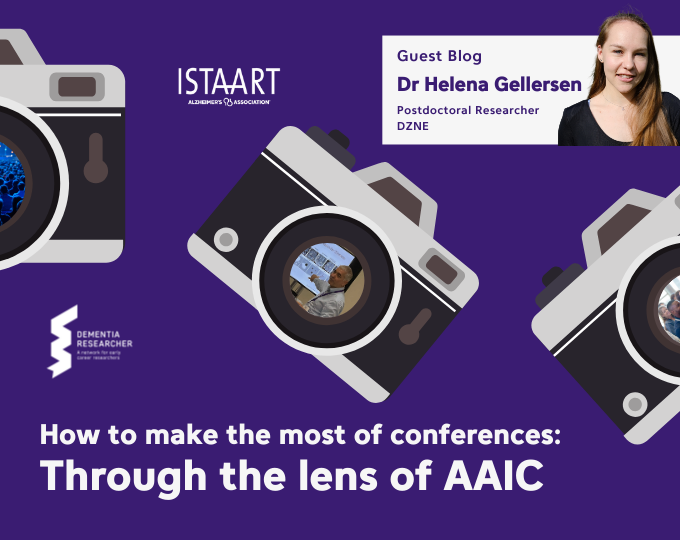
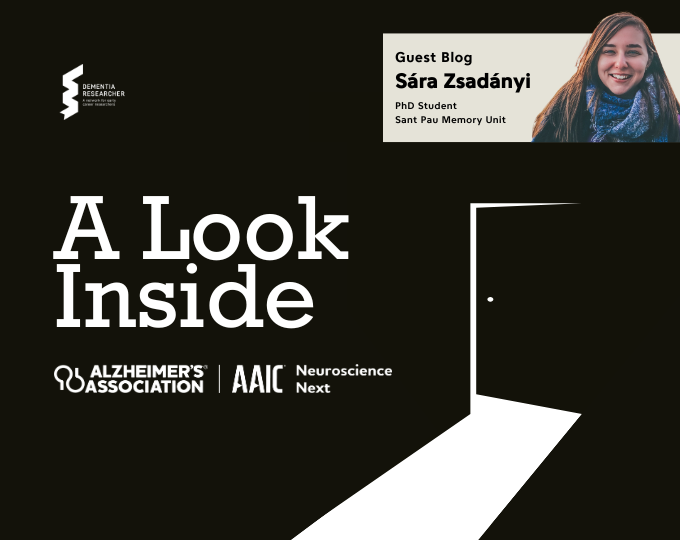
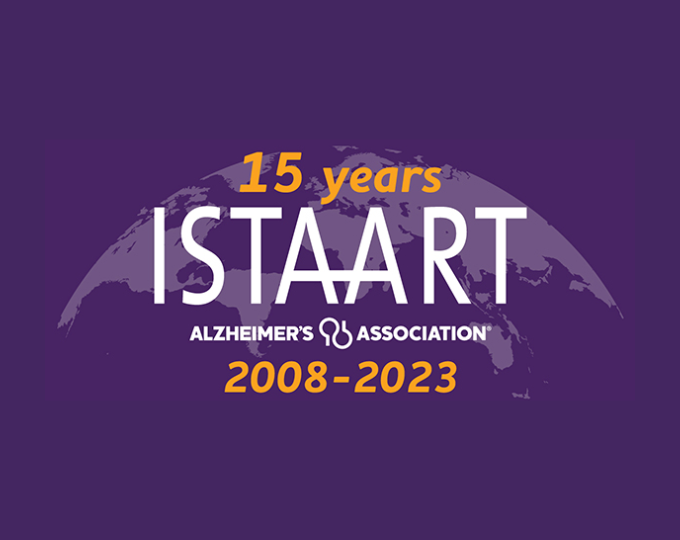

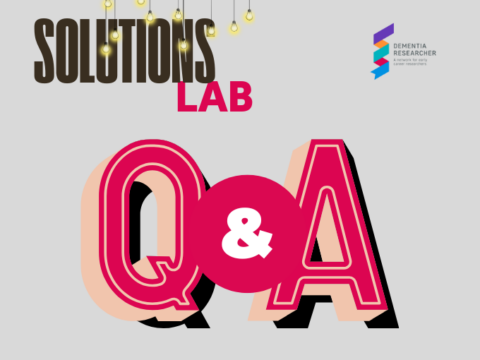
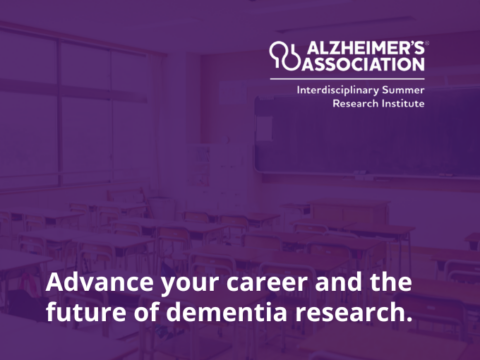

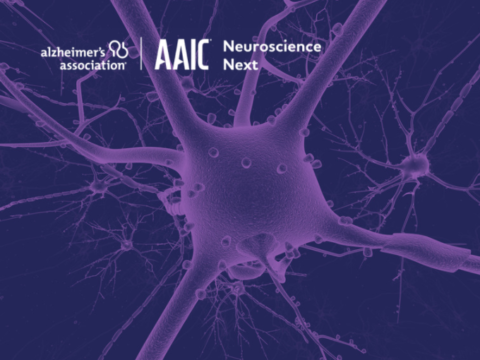
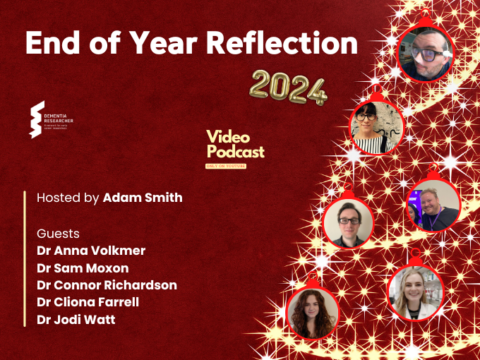
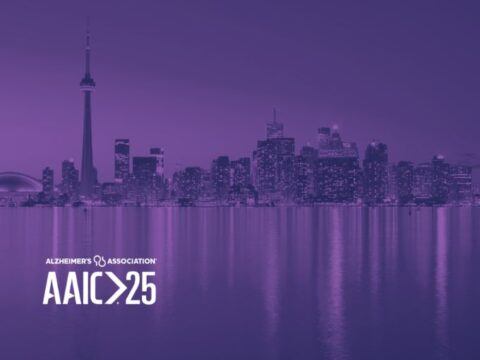
You may be interested in my article about AAIC.
https://www.linkedin.com/pulse/aaic-2024-from-perspective-person-dementia-michael-ellenbogen–d7p1e/?trackingId=bgS4QIGD0%2Fx0w7KElKC7yg%3D%3D
https://www.mathewsopenaccess.com/journals/neurology/abstract/aaic-2024-from-the-perspective-of-a-person-with-dementia